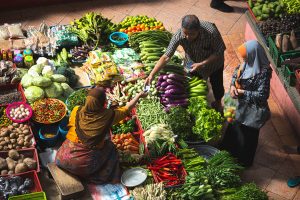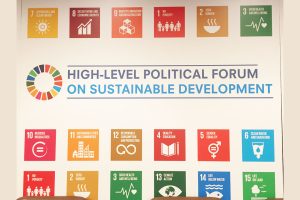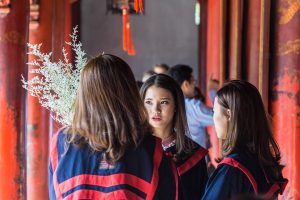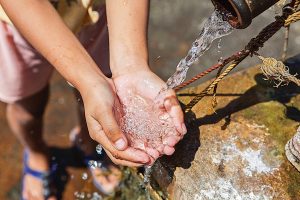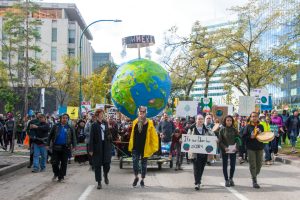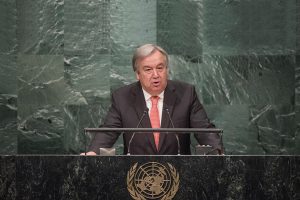The UN system, Member States, and stakeholders are moving ahead with preparations for the 2024 session of the UN High-level Political Forum on Sustainable Development (HLPF) in July. Themed, ‘Reinforcing the 2030 Agenda and eradicating poverty in times of multiple crises: The effective delivery of sustainable, resilient and innovative solutions,’ HLPF 2024 will hold in-depth reviews of five Goals – SDG 1 (no poverty), SDG 2 (zero hunger), SDG 13 (climate action), SDG 16 (peace, justice and strong institutions), and 17 (partnerships for the Goals).
The Forum’s 2024 session will be the first under the auspices of the UN Economic and Social Council (ECOSOC) after the 2023 SDG Summit – the HLPF convening under the auspices of the UN General Assembly (UNGA). HLPF 2024 will support the implementation of the SDG Summit’s Political Declaration and other outcomes with a view to advance the 2030 Agenda for Sustainable Development and its SDGs.
The UN Secretariat’s concept note for the July session is available in PDF format. The provisional agenda (forthcoming) will be published here. The draft programme of work for the session, dated 13 June, provides information on daily events and includes guiding questions for the thematic sessions. An annotated programme, with speakers for HLPF 2024 and the ECOSOC High-level Segment, will be published here, to be updated as needed. Background notes for the thematic sessions are here.
In addition to the official programme, the HLPF Secretariat has released the details on 13 special events taking place during the Forum:
- 2024 SDG Learning, Training and Practice Opening Segment, on 8 July;
- Science Day 2024, on 9 July;
- Local2030 Coalition Special Event at 2024 HLPF, on 10 July;
- 2024 Local and Regional Governments Forum, on 11 July;
- Special Event on Transforming Education, on 11 July;
- Special Event on Financing to End Hunger, Food Insecurity, and Malnutrition in All Its Forms, on 15 July;
- Higher Education Sustainability Initiative (HESI) Global Forum 2024, on 15 July;
- Keeping the SDG Promise: Pathways to Acceleration, on 15 July;
- Delivering the Future We Want, on 15 July;
- SDG 6 Water Action Agenda Special Event 2024, on 16 July;
- 2024 Parliamentary Forum, on 16 July
- 2024 SDG Global Business Forum, on 16 July; and
- Bridging the Ambition Gap for the Future We Want Through Climate and SDGs Synergy, on 16 July.
The HLPF Secretariat has also published a tentative programme of side events taking place in the margins of HLPF 2024. The list, dated 24 June, is available here.
The 2024 VNR Labs will have the collective theme, ‘Towards Sustainable, Resilient and Innovative Solutions.’ The VNR Labs convene on the sidelines of the HLPF to provide “an informal platform for experience sharing and reflection” on the voluntary national review (VNR) process. They take place under Chatham House rules.
The latest Information Note on the arrangements for HLPF 2024 and the ECOSOC High-level Segment provides details on the format, venue, participation, and logistics.
The governments that will present VNRs of SDG implementation during HLPF 2024 have released the main messages of their reports. Armenia, Austria, Azerbaijan, Belize, Brazil, Chad, Colombia, the Republic of the Congo, Costa Rica, Ecuador, Equatorial Guinea, Eritrea, Georgia, Guinea, Honduras, Kenya, the Lao People’s Democratic Republic (PDR), Libya, Mauritania, Mauritius, Mexico, Namibia, Nepal, Oman, Palau, Peru, Samoa, Sierra Leone, Solomon Islands, South Africa, South Sudan, Spain, Syria, Uganda, Vanuatu, Yemen, and Zimbabwe – a total of 37 countries – will present their VNRs at HLPF 2024.
The co-facilitators for the negotiations on the HLPF Ministerial Declaration – the Dominican Republic and Norway – circulated a “zero draft” of the outcome document on 30 April. Member States exchanged initial views on the zero draft during an informal consultation on 7 and 8 May. Informal consultations continue.
The Major Groups have submitted position papers on the theme of HLPF 2024. Their executive summaries are compiled in a preparatory document. The contributors are “major groups and other relevant stakeholders that have autonomously established and maintained effective coordination mechanisms for participation” in the HLPF. They include: Women; Non-governmental Organizations (NGOs); Local Authorities; Workers and Trade Unions; Business and Industry; Scientific and Technological Community; Ageing; Persons with Disabilities; Education and Academia; Asia-Pacific Regional Civil Society Organization (CSO) Engagement Mechanism; Economic Commission for Europe Regional Civil Society Engagement Mechanism; Communities Discriminated by Work and Descent; Lesbian, Gay, Bisexual, Transgender and Intersex (LGBTI) Persons; Civil Society Financing for Development (FfD) Mechanism; Sendai Framework for Disaster Risk Reduction (DRR) 2015-2030; and Together 2030.
The functional commissions of ECOSOC have also submitted input on the theme of the session, discussing their contributions to implementing the 2030 Agenda. Another input to the HLPF is a compilation of reports from the UN’s regional commissions (E/HLPF/2024/3). The submissions present summaries of the 2024 regional forums on sustainable development (RFSDs) that took place in Africa, the Arab Region, Asia-Pacific, Europe, and Latin America and the Caribbean (LAC).
Other official inputs include: the UN Secretary-General’s SDG Progress Report assessing progress made since 2015 against the global SDG indicator framework; the Secretary-General’s report outlining long-term impacts of current trends on the realization of the SDGs; a report on the 2024 annual theme of ECOSOC and the HLPF; and the Secretary-General’s synthesis of developments since the 2023 UN Food Systems Summit+2 Stocktaking Moment (UNFSS+2).
HLPF 2024 convenes in advance of the Summit of the Future in September, which will “serve[] as a moment to mend eroded trust and demonstrate that international cooperation can effectively achieve agreed goals and tackle emerging threats and opportunities.”
Also in 2024, the HLPF and ECOSOC underwent review by the UNGA. The intergovernmental process to review the arrangements, led by Guinea and Latvia, concluded in early June. On 7 June, the UNGA adopted the resolution forwarded by the co-facilitators without a vote. The resolution sets the HLPF themes for 2025, 2026, and 2027, and decides on the sets of Goals the HLPF will review each of these years. [SDG Knowledge Hub Coverage of HLPF 2024]


